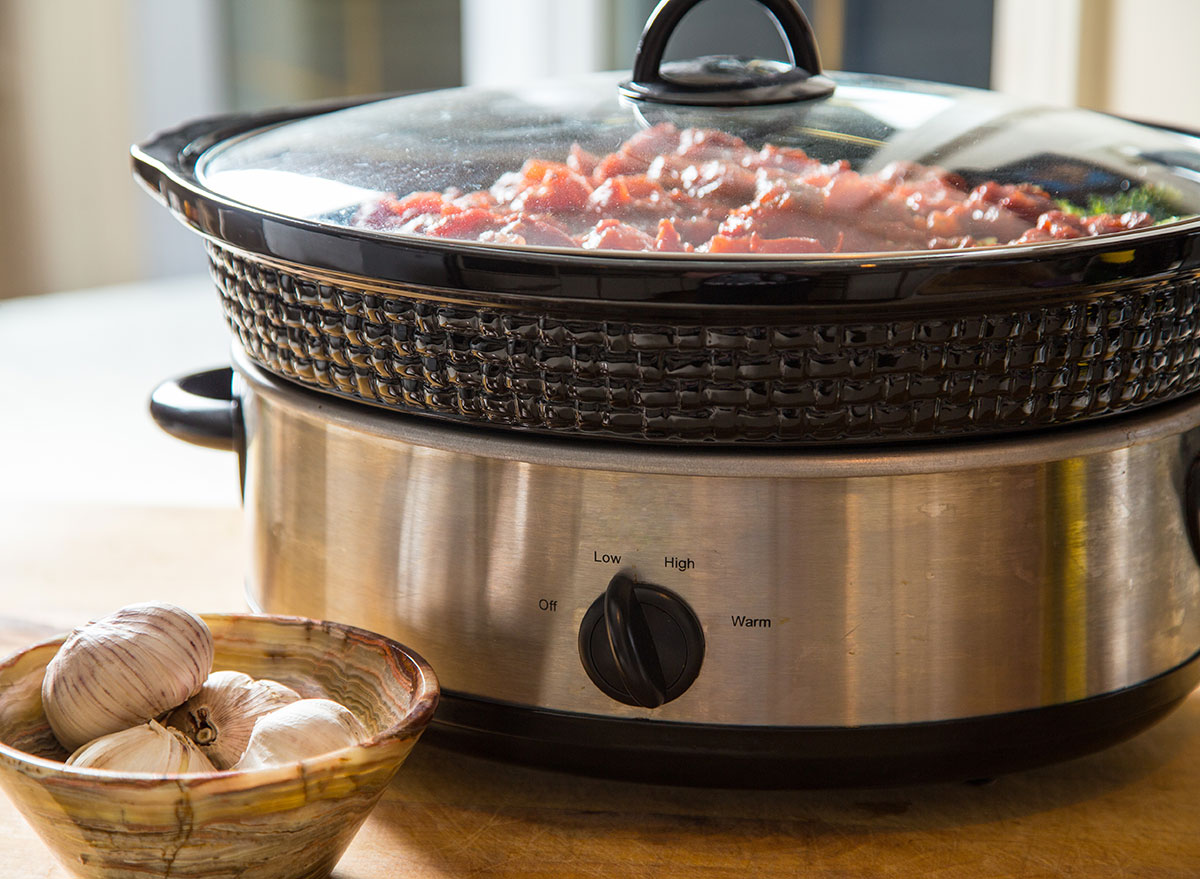
Slow cookers can produce absolutely delicious meals. From chili to roasts to dump cakes, and they are perfect for savory and sweet dishes. And slow cookers are perfect if you have minimal meal prep time. (Honestly, who doesn't love coming home to a homecooked meal that's ready to eat after a long day?) However, don't let the simple and convenient design of slow cookers you—slow cooker mistakes that can influence the outcome of your meals are easier to come by than you may realize. That said, once you're made aware of common slow cooker trappings and how to avoid them, you'll really be able to appreciate the joys of cooking with this appliance.
"Using a slow cooker requires minimal cooking knowledge and effort, so it's a perfect small appliance for those who want homecooked meals without a lot of effort when it comes to getting a meal on the table," says Amber Pankonin, MS, RD, LMNT, CEC, registered dietitian and certified executive chef.
"I love slow cookers because of their convenience," says Laura Mason, professional chef & autoimmune wellness blogger at Love Chef Laura. "Slow cooker recipes are generally easy and require very little prep work. I love placing all the ingredients into one pot, knowing I will have a delicious meal in a few hours with little cleanup."
But not all slow cookers are created equal. You can easily ruin a meal if you don't use proper technique while cooking with one.
"They can vary in size, cooking temperatures, and even features that include timers or Bluetooth," says Pankonin. And with all the latest gadgets and gizmos integrated into many of the slow cooker models on the market today, it's no wonder that cooking with some can sometimes get a little confusing.
To help you work your appliance like a pro, here are 14 of the biggest slow cooker mistakes that will ruin your dinner—and how to avoid them. And for more tips that can help make cooking a nutritious meal a breeze, be sure to also check out 55 Healthy Recipes to Make in 10 Minutes (or Less).
Mistake #1: Not searing a roast before slow cooking
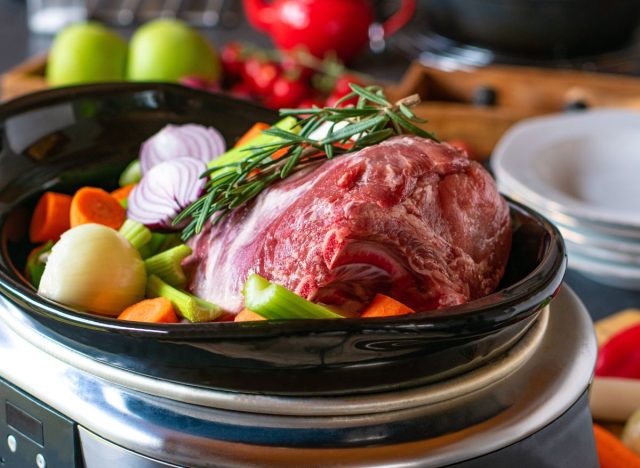
Before you throw a roast into the slow cooker, this simple step will make it even more delicious: "Taking the time to sear a roast before slow cooking allows for more flavors to develop and can also help add texture to the final product," explains Pankonin.
Instead, she suggests using a sauté pan to warm a small amount of oil over medium-high heat.
"Season the roast with kosher salt and pepper and then sear all sides of the roast," she adds. "For additional flavor, save the drippings in the pan to add to the slow cooker."
Mistake #2: Using the wrong temperature setting
Slow cookers usually have two or three temperature settings: low, high, and sometimes medium. Choosing the right one for the dish you're preparing is important.
"Generally, low heat is best for tougher cuts of meat and longer cooking times, while high heat is better for quicker cooking times and more tender cuts of meat," says Pennington. "Some slow cooker recipes will give you times for both high and low, so it's added convenience to your schedule."
"There are programmable slow cookers with temperature probes that allow you to cook the exact temperature called for in the recipe and then automatically switch to warm," Pennington adds.
Mistake #3: Opening the lid too often
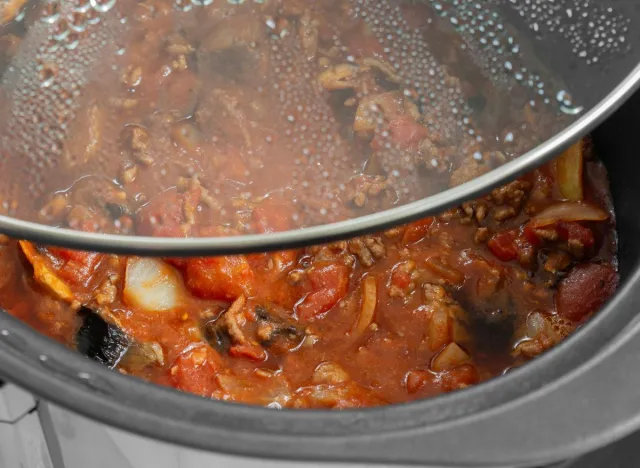
While it may be tempting to check on your food in the slow cooker, try not to remove the lid while your food is still cooking.
"Slow cookers have to build up heat, which can take some time," says Mason. "Removing the lid too often results in lost heat, altering the cooking time."
"Only lift the lid when the food is nearly finished," she advises. "This way, heat has had an opportunity to build up, and the contents are likely already or close to being cooked."
"If you lift the lid, you may need to add 5–10 minutes to the cooking time to adjust for lost heat," Mason adds.
Mistake #4: Adding all the ingredients at once
Dumping and going may not work for all slow cooker recipes.
"All food ingredients cook at different times. Add ingredients in intervals unless the recipe calls for it to ensure even cooking," says Mason. "The key to a successful slow cooker meal is having all the ingredients cooked to their desired tenderness and finished simultaneously. For example, if you are making a pot roast, allow the meat to cook, wait a few hours and then add chopped carrots and chopped potatoes. When beef takes longer to cook, adding them simultaneously will give you mushy carrots and potatoes that fall apart. Understanding how long it takes different food items to cook can prevent this."
Mistake #5: Thinking the liquid is going to evaporate
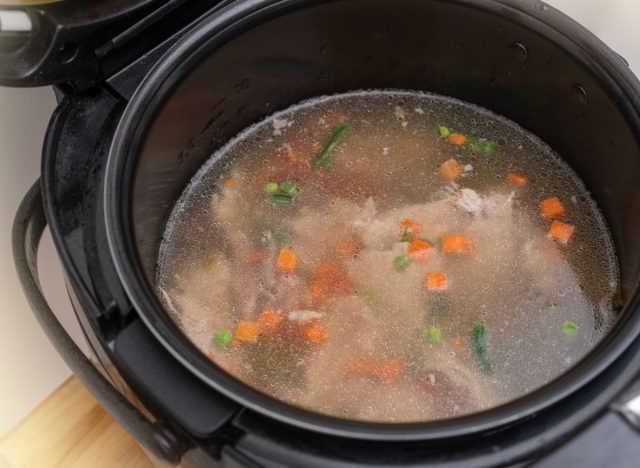
"Liquids do not evaporate in a slow cooker," says Paula Pennington, senior product manager at Hamilton Beach Inc., a home appliances and commercial restaurant equipment distributor. "If a recipe calls for liquid reduction, it will need to be reduced after the food is cooked or before cooking on the stovetop."
Mistake #6: Using cuts of meat that are too tender and allowing them to overcook
Choosing the right cut of meat is crucial to ending up with a delicious meal made via your slow cooker.
"You can still slow cook lean meats—but lean meats can tend to dry out in the slow cooker, especially if a minimal amount of liquid is used," says Pankonin. "Slow cookers are perfect for those cuts of meat that are more tough and higher in fat, which include cuts like the chuck or round. The slow cooker helps to break down the connective tissue, leading to a more tender product."
Mistake #7: Not submerging meat in enough liquid
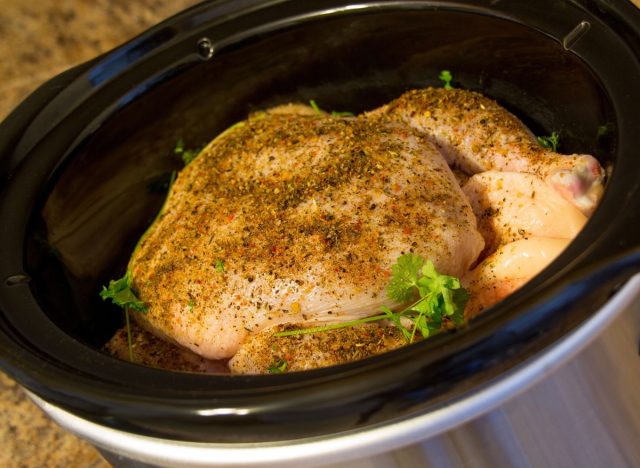
Even though you may not think you need that much liquid when using a slow cooker, more is always better than less.
"Not submerging meat in the cooking liquid can result in uneven cooking and tough areas," says Mason. "Slow cookers work by creating steam. Submerging meat in enough liquid ensures even cooking. If there is insufficient liquid, heat can not be generated, resulting in uneven or uncooked meat. Always fill a slow cooker three-fourths of the way with liquid."
Mistake #8: Adding too much alcohol to the slow cooker
While certain types of alcohol can add flavor to your slow cooker meal, it may actually end up messing with the taste.
"When you cook with alcohol on the stovetop or oven, alcohol can help deglaze a pan or add flavor to a dish as it evaporates. When adding to a slow cooker, the alcohol is essentially trapped, which might cause the product to taste bitter," says Pankonin. "Limit the amount of alcohol that is used or prepare sauces on the side if you want a wine sauce served with your slow-cooked proteins."
Mistake #9: Adding dairy or delicate ingredients too early
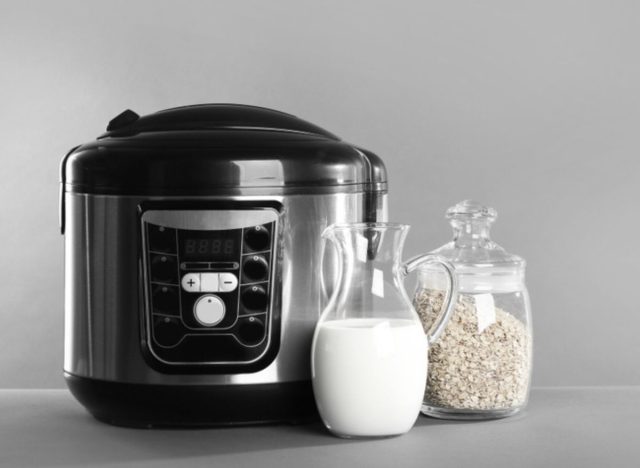
Timing with ingredients is also essential for preparing a quality slow cooker meal.
"Dairy products and delicate ingredients such as herbs and spices, fish, and shellfish can break down or curdle if added too early in the cooking process," says Pennington. "It's best to add these ingredients toward the end of the cooking time."
Mistake #10: Not using a liner for your slow cooker
Clean-up can be a hassle when using a slow cooker–but not if you use a liner.
"If you choose to use a slow cooker because you want to save yourself the work of cooking, the clean-up process might be a different experience based on what you've prepared," says Pankonin. "Liners can help make clean up fast and simple, especially if the slow cooker contains high protein ingredients like cream cheese or cheese sauce that can get stuck on the sides if sitting in the slow cooker for a long time."
Mistake #11: Overfilling your slow cooker
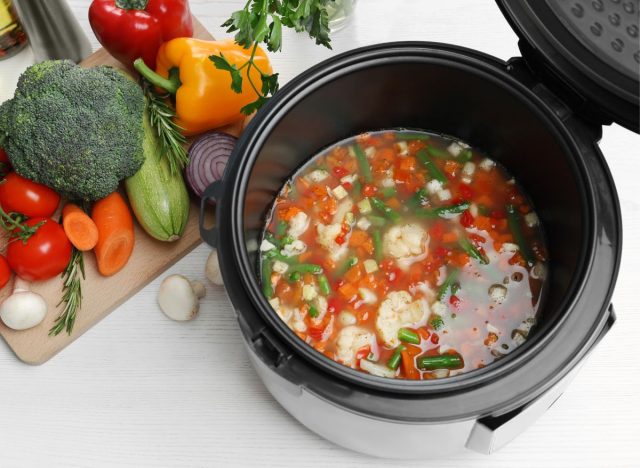
While most slow cookers are pretty big, you shouldn't fill up the entire pot.
"It's important not to overfill the slow cooker, as this can cause the food to cook unevenly and take longer to reach the desired temperature," says Pennington. "Fill the slow cooker no more than two-thirds full."
Mistake #12: Not defrosting food first
If you fail to defrost certain ingredients, you could actually make yourself sick.
"Slow cookers cook food very slowly over a long period of time. It is extremely important to cook all food at a speed where bacteria can not multiply. Adding frozen food to a slow cooker can increase the risk of foodborne illness," says Mason. "Always add thawed food to a slow cooker. This may mean you have to plan before starting a recipe. That little bit of extra work is worth it so you and your family or friends don't get sick."
Mistake #13: Not removing your product in a timely manner
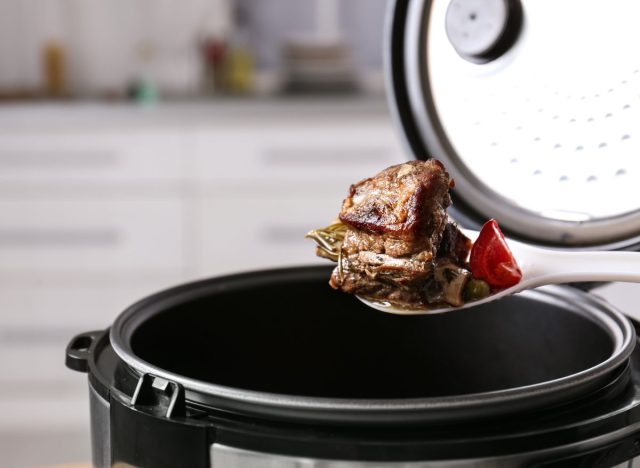
Once your slow cooker recipe is done cooking, be sure to remove it from the cooker.
"The product should not sit in the slow cooker for hours upon hours after it's finished, as this can decrease the quality of the product and could lead to foodborne illness," says Pankonin.
Mistake #14: Keeping leftovers stored in the cooking chamber
Storing your leftover dinner in the chamber of your slow cooker as if it were Tupperware is also a regrettable error that can impact the quality of your next meal. It may even present obstacles while reheating your leftovers too.
"It's also a mistake to keep the product stored in the cooking vessel, as it won't cool as quickly and will take longer to heat up if you choose to warm it using the heating element," explains Pankonin. "Once the meal is cooked and dinner is served, you should remove it from the cooking vessel, let the product cool and then place it into the refrigerator."









